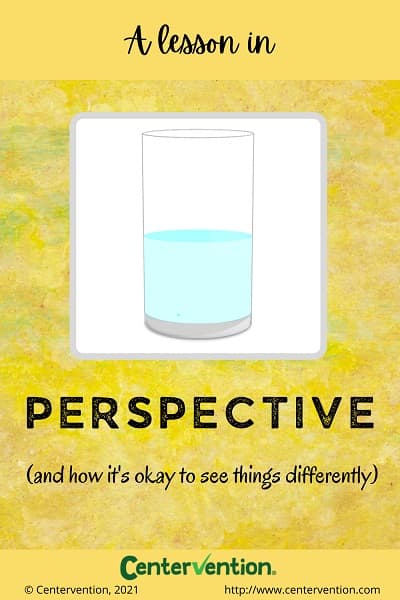Perspective taking activities can be confusing. Is the glass half empty or half full? Is the Mona Lisa smiling? Are roller coasters thrilling or are they terrifying? Your answers to these questions may be very different from how the person who read this article before you, and quite possibly may even be different from how you would have answered them as a child.
Perspective is an almost magical concept because many of us can look at or experience the exact same thing, but somehow see or feel things that are quite the opposite! This is largely because perspective is a personalized concept that is grounded by both where one physically stands as well as where they’ve stood before.
Research suggests that our past experiences, how we interpret them, and the feelings they create stick with us and can influence our future perspective, feelings, and actions, for better or for worse. For example, someone who grew up near train tracks may find the sound of busy rails relaxing to fall asleep to, while someone else may be kept up by the perceived racket. Keeping mindful of this, if we practice self-awareness while navigating various situations, we are better able to reflect on why we may feel a certain way about one thing or another and understand when someone else may not share that same feeling. This process is the first step to truly unpacking perspective taking, which plays a vital role in empathetic thinking and communication.
Many of the Centervention online SEL interventions provide students with a chance to explore perspective and empathy. In Zoo U, players help one another navigate physical perspective by providing clues to where a lost toy airplane is hidden, and aboard the SS Grin students must sort through facts and assumptions to unfold the truth behind each character’s perspective.
This fun perspective taking activity will also give students a chance to understand that how we think or feel is influenced by personal experiences, and that it’s okay to talk about and celebrate our unique point of view!
Recommended Grade Level: Elementary and Middle School
SEL Skill(s): Communication, Empathy
Duration: 30 minutes
Materials:
Perspective Taking Activity Instructions
Prep: Print out or display on the board the What Is That and What Does This Remind You Of cards. Print one set of Perspective cards for each pair of students.
Prompt: Gather students and tell them they will play a game. You will show them a picture and they will have to guess what it is. Show them the What is that cards and reveal the answers after spending time guessing.
Say:
“The pictures were from very up close, but when the camera stepped back it changed our perspective or how we saw it. “When we see it from far away it looks different!” Now show the first What Does That Remind You Of card and say:
“Now I’m going to show you some other things. You can probably guess what they are! This time, I want you to turn and talk to a neighbor about what the picture reminds you of and how it makes you feel. Be sure to listen to your partner’s answer— it may be different than yours!” After you have shown the cards ask volunteers to share any differences they may have had from their partner’s answer.
Say: “Sometimes certain things make us feel different because of what we remember from our own lives.”
Play: Now distribute sets of cards to partners. Have them spread throughout the room to look at the cards together. Tell them that as they read each card they can think about three questions:
- What do you know about this?
- Why might you think that?
- How does it make you feel?
Conclude: Regroup and allow pairs to share some of the similarities and differences they noticed.
Say: “The way we think and feel about something can have a lot to do with our perspective. A perspective can come from what you know about something already, an experience you’ve had with something, or what you can tell about something from how it looks to you.”
